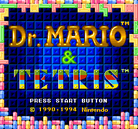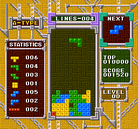Tetris & Dr. Mario: Difference between revisions
Jump to navigation
Jump to search
No edit summary |
No edit summary |
||
| Line 19: | Line 19: | ||
*Diagonal motion (soft drop + shift) in Tetris | *Diagonal motion (soft drop + shift) in Tetris | ||
*More flexible [[wall kick]]s in Dr. Mario | *More flexible [[wall kick]]s in Dr. Mario | ||
In this revision, all of the [[DAS]] mechanics from [[Tetris (NES, Nintendo) | NES Tetris]] were retained. However, other timings and behaviors were altered slightly. [[ARE]] is 25 frames, and [[line clear]] delay adds 26 frames. In addition to this change, there are also 12 frames at the start of active time during which gravity is not applied. | |||
<br clear="all"> | <br clear="all"> | ||
==See also== | ==See also== | ||
Revision as of 21:38, 16 May 2010
| Tetris & Dr. Mario | |
|---|---|
| File:Tetris and Dr Mario.jpg | |
| Developer(s) | Nintendo |
| Publisher(s) | Nintendo |
| Platform(s) | SNES |
| Release | December 30, 1994 |
| Gameplay info | |
| Next pieces | 1 |
| Playfield size | 10w x 20h (Tetris); 8w x 16h (Dr. Mario) |
| Hold piece | No |
| Hard drop | Soft only |
| Rotation system | Nintendo Rotation System (Tetris); Dr. Mario domino system with extra wall kicks (Dr. Mario) |
Tetris & Dr. Mario for Super NES is a compilation of Tetris and Dr. Mario (hence the name). Both games are a revamped version of their NES counterpart. New features:
- Mixed Mode - each player plays a level of B-type Tetris, a level of Dr. Mario, and uses the remaining time to score points in A-type Tetris.
- Tetris 2-player with garbage - based on the Game Boy version.
- CPU opponents in both Tetris and Dr. Mario
- Diagonal motion (soft drop + shift) in Tetris
- More flexible wall kicks in Dr. Mario
In this revision, all of the DAS mechanics from NES Tetris were retained. However, other timings and behaviors were altered slightly. ARE is 25 frames, and line clear delay adds 26 frames. In addition to this change, there are also 12 frames at the start of active time during which gravity is not applied.
See also
| ||||||||||||||

